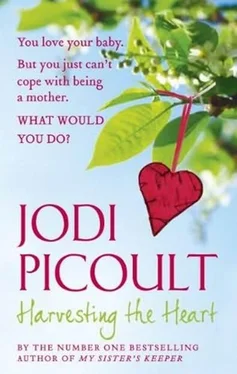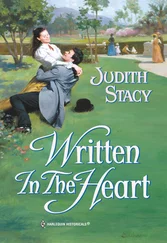The path forked again at a sturdy wooden fence. It either continued up a heathered hill or let you through a gate into a big oval littered with fences and bahayÑ€†rs and redwood barricades. Riding along the edge of the oval, toward me, was a woman on a horse. I could not see her face, but she was tall and thin and seemed to know what she was doing. The horse shook his head from left to right. “Jeez, Eddy,” she said as she came by me, “take it easy. Everyone’s got to deal with the bugs. You think you’ve got a monopoly on them?”
I listened carefully, trying to remember my mother’s voice, but I honestly wouldn’t have been able to pick it out from others. This could be my mother-if I could just see her face. But she had rounded the curve and was now riding away from me. The only other person there was a man, kind of short, wearing jeans and a big polo shirt and a tweed newsboy’s cap. I could not hear his voice, but he was calling out to the woman riding.
The woman kicked the horse, and he began flying around the edge of the track. He jumped a thick blue wall, and then another high rail, and suddenly he was coming a hundred miles an hour directly toward me. I could hear the heavy breath of the rider and see the flared nostrils of the horse as he thundered closer. He wasn’t going to stop. He was going to take the gate next, and I was right in his way.
I crouched down and covered my head with my arms just as the horse came to a dead halt inches in front of me. His heavy head was above the gate, his nose grazed my fingers. In the background, the man called something out. “Yes,” the woman said, looking down at me. “It was the best line yet, but I think we’ve scared someone half to death.” She smiled at me, and I could see that her hair was blond and her eyes were brown and that her shoulders were much wider than any I’d ever seen on a woman; that she wasn’t my mother at all.
I mumbled an apology and headed up the other fork of the path. It opened into a vast field that was sprinkled with buttercups and wild daisies, with grass growing higher than my thighs. Before I saw them, I heard the rhythm of their hooves- da da dum, da da dum -two horses tearing across the field as if they were being chased by the devil. They jumped a brook and ran up to the fenced edge of the pasture. They lowered their heads to graze, their tails switching back and forth in metronome time like the long swinging hair of exotic dancers.
By the time I returned, there was no one riding in the little oval. I headed back toward the barn where that boy had been, figuring I could ask for better directions. As I walked up the hill, I saw the man who had been calling out the things I couldn’t hear, holding tight to a thick leather strap that was clipped to Eddy’s halter. He held a dripping sponge in his other hand, but as soon as he touched it to Eddy’s flank, the horse twisted away violently. I kept my distance, half hidden. The man dripped the sponge over the horse’s back, and again it bucked to the left. The man dropped the sponge and lightly whipped the horse twice across the neck with the strap, then tucked it over the nose and through the muzzle of the halter. The horse quieted and bowed his head, and the man began to talk softly, running his hand over the horse’s spine.
I decided to ask this man about my mother, so I stepped forward. He put down the sponge and lifted his head, but his back was to me. “Excuse me,” I said quietly, and he spun around so fast that his hat came off and a thick tumble of dark-red hair fell down.
This was not a majumÑ€†n. This was my mother.
She was taller than I was, and leaner, and her skin was the color of honey. But her hair was like mine, and her eyes were like mine, and there was no mistaking it. “Oh, my God,” she said.
The horse snorted over her shoulder, and water dripped off his mane to form a puddle on my mother’s shirt. She did not seem to notice. “I’m Paige,” I said, stiffly, and impulsively I held out my hand to shake hers. “I’m, um, your daughter.”
My mother began to smile, and it melted her from her head to her feet, making her able to move again. “I know who you are,” she said. She did not take my hand. She shook her head and knotted her fingers around the leather lead. She fidgeted, scuffing the toes of her boots in the loose gravel. “Let me get rid of Eddy,” she said. She pulled on the lead and then stopped to turn back to me. Her eyes were huge and pale, the eyes of a beggar. “Don’t go anywhere,” she said.
I followed a few steps behind the horse she led. She disappeared into a stall-the one the boy had been cleaning-and slid the halter off the horse’s head. She stepped out, latched the mesh gate, and hung the leather contraption on a nail pegged to the right of the stall. “Paige,” she said, breathing my name as if it were forbidden to speak aloud.
She reached toward me and touched her palm to my shoulder. I could not help it; I shivered and stepped back. “I’m sorry,” I said, looking away.
At that moment the boy who had been working the stable earlier appeared out of nowhere. “I’m done for the day, Lily,” he said, although it was only noon.
My mother dragged her gaze away from me. “Josh,” she said, “this is Paige. My daughter, Paige.”
Josh nodded at me. “Cool,” he said. He turned to my mother. “Aurora and Andy need to be brought in. I’ll see you tomorrow. Although,” he said, “tomorrow is just the flip side of today.”
As he walked down the long aisle of the barn, my mother turned to me. “He’s a little bit Zen,” she said, “but he’s all I can afford right now.”
Without another word, my mother walked out of the barn and headed down the gravel path toward the field that ran to the left. When she reached the field she propped her elbows against the wooden gate and watched the horse at the far end. Even at this distance he was one of the largest horses I had ever seen. He was sleek and sable-colored, with the exception of his two front legs. They turned pure white halfway down, as if he’d only just stepped into heaven. “How did you find me?” my mother asked nonchalantly.
“You didn’t make it easy,” I snapped. I was fuming. My mother didn’t seem the tiniest bit put out by my appearance. I was more rattled than she was. Sure, there had been that shock of surprise, but now she was acting cool and relaxed, as if she’d known I was coming. This was not the way I’d thought she would be. I realized that at the very least, I’d expected her to be curious. At the very most, I had wanted her to care.
I turned to her, waiting for a splinter of real recognition to hit me-some gesture or smile or even the lilt of her voice. But this was an entirely different woman from the one who had left me when I was five years old. I had spent the past few days-the past twenty years-conjuring up comparisons between us, making assumptions. I knew we would bear a resemblance to each other. I knew that we had both been driven away from out homes, although I didn’t know why she had left. I imagined that I would meet her and she would reach out her arms for me and there I would be, in the place where I always knew I would fit best. I imagined that we would sound the same, walk the same, think the same. But this was her world, and I knew nothing about it. This was her life, and it had gone smoothly without me around. The truth was that I barely knew her when she left and that I did not know her now. “A friend of mine introduced me to a private eye, and he tracked you to Bridles & Bits,” I said, “and then I saw the ceiling.”
“The ceiling,” my mother whispered, her thoughts far away. “Oh-the ceiling. Like Chicago.”
“Just like,” I said, my words clipped and bitten.
Читать дальше












